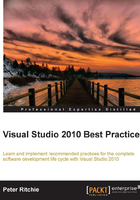
Preface
When you are developing on the Microsoft platform, Visual Studio 2010 offers you a range of powerful tools and makes the entire process easier and faster. After learning it, if you think that you can sit back and relax, you cannot be further away from truth. To beat the crowd, you need to be better than others, learn tips and tricks that other don’t know yet. This book is a compilation of the best practices of programming with Visual Studio.
Visual Studio 2010 Best Practices will take you through the practices you need to master programming with the .NET Framework. The book goes on to detail several practices involving many aspects of software development with Visual Studio. These practices include debugging, exception handling, and design. It details building and maintaining a recommended practices library and the criteria by which to document recommended practices.
The book begins with practices on source code control (SCC). It includes different types of SCC and discusses how to choose them based on different scenarios. Advanced syntax in C# is then covered with practices covering generics, iterator methods, lambdas, and closures.
The next set of practices focus on deployment, as well as creating MSI deployments with Windows Installer XML (WiX), including Windows applications and services. The book then takes you through practices for developing with WCF and Web Service.
The software development lifecycle is completed with practices on testing, such as project structure, naming, and the different types of automated tests. Topics such as test coverage, continuous testing and deployment, and mocking are included. Although this book uses Visual Studio as an example, you can use these practices with any IDE.